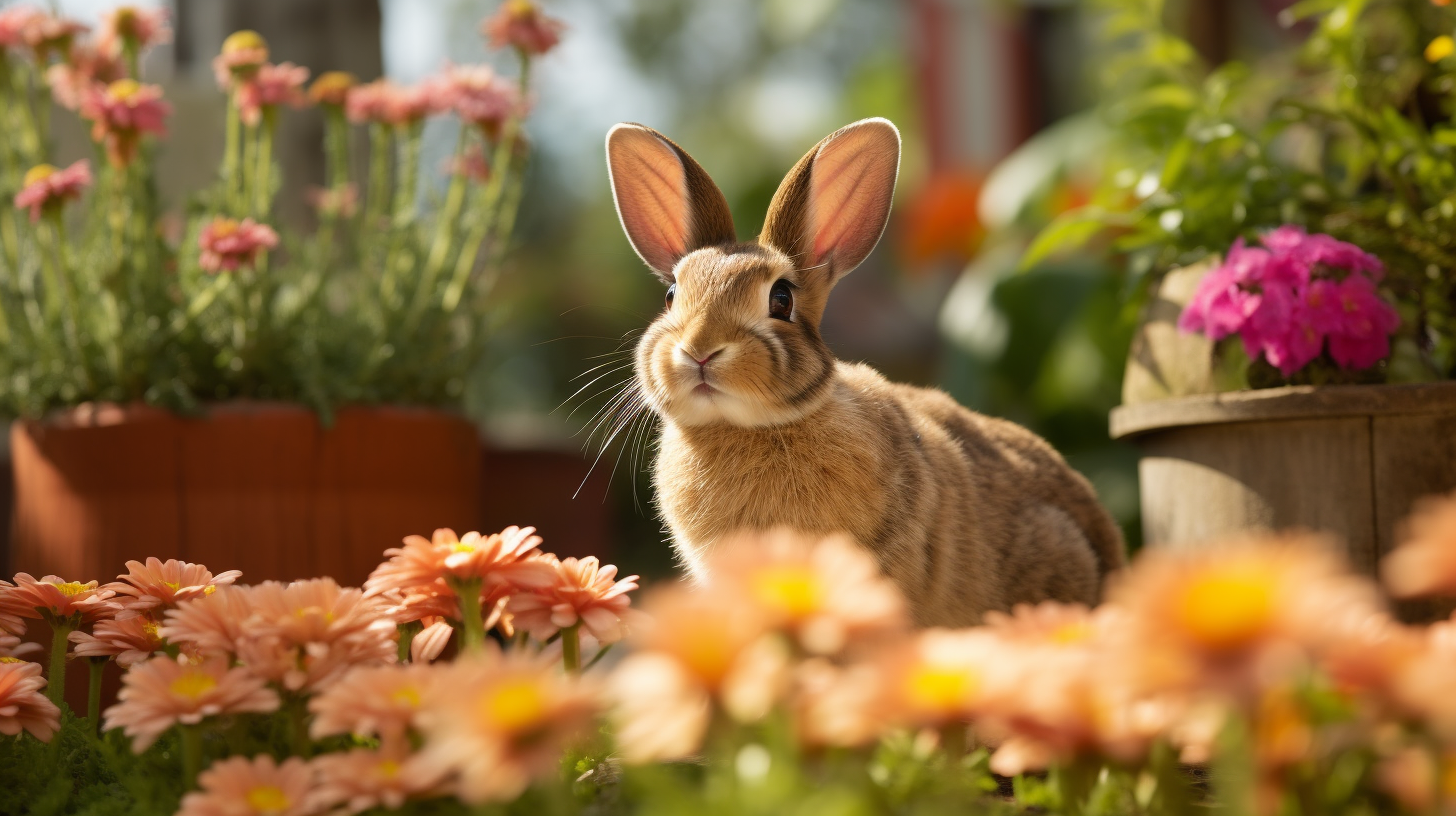Yes, rabbits do eat zinnias. If you’re a gardener who loves the vibrant colors and beauty of zinnias, you may be concerned about how to protect them from rabbit damage. Rabbits are herbivorous animals and can be quite voracious when it comes to munching on plants in your garden. In this article, we will provide you with valuable insights and tips to keep your zinnias safe from these hungry little creatures. We’ll explore the feeding habits of rabbits, discuss effective deterrents, and share strategies to create a rabbit-resistant garden.
Understanding Rabbit Feeding Habits
Before we delve into ways of protecting your zinnias, it’s important to understand the feeding habits of rabbits. These furry herbivores have a constant need to graze on vegetation to meet their nutritional requirements. They have sharp incisors that continuously grow, and by chewing on plants, they help keep their teeth from overgrowing.
When it comes to zinnias specifically, rabbits are particularly attracted to their tender leaves and flowers. Zinnias have a variety of vibrant colors and can be quite enticing for these adorable yet pesky creatures. If rabbits have access to your garden, they will likely consider your zinnias as an all-you-can-eat buffet.
Strategies to Protect Your Zinnias
Now that you understand rabbits’ affinity for zinnias, let’s explore some effective strategies to keep them away from your precious blooms.
1. Physical Barriers
One of the most effective ways to protect your zinnias from rabbits is to create physical barriers. Building a fence around your garden or individual plantings can be highly effective. Choose a fence material that rabbits cannot easily chew through, such as chicken wire or hardware cloth.
When installing the fence, make sure it is at least 2 feet tall, as rabbits are capable of jumping over lower barriers. Additionally, bury the bottom of the fence at least 6 inches underground to prevent rabbits from digging underneath. It’s important to secure the fence tightly and eliminate any openings to ensure the rabbits cannot squeeze through.
2. Repellents
Another option to deter rabbits from feasting on your zinnias is to use repellents. There are several commercial rabbit repellents available that contain ingredients such as garlic, pepper, or predator urine. These repellents emit scents or tastes that rabbits find unpleasant, deterring them from approaching your plants.
If you prefer a more natural approach, you can create your own homemade repellents using ingredients like crushed red pepper, diluted vinegar, or blood meal. Apply these repellents directly onto your zinnias or around the perimeter of your garden. Be sure to follow the instructions on the repellent products or consult reliable sources for homemade recipes.
3. Cages and Netting
For individual zinnia plants that are particularly vulnerable to rabbit damage, consider using cages or netting. Constructing a wire mesh cage around each plant creates a physical barrier that prevents rabbits from accessing the zinnias. Make sure the cage has small enough openings to keep rabbits out while still allowing the zinnias to receive sunlight and grow.
If you have a larger area with multiple zinnias, using netting can be an effective solution. Simply drape the netting over the zinnias, ensuring it is secured tightly to prevent rabbits from lifting or chewing through it. Netting not only protects your zinnias from rabbits but can also deter other pests like birds and squirrels.
4. Companion Planting
Companion planting is a natural and eco-friendly method to deter rabbits from your zinnias. By planting certain companion plants alongside your zinnias, you can create an environment that rabbits find unattractive or confusing. Some plants that rabbits tend to avoid include marigolds, lavender, daffodils, and sage.
Interspersing these rabbit-resistant plants throughout your garden can help protect your zinnias. Not only will they act as a deterrent, but the vibrant colors and fragrant smells of these companion plants will also add beauty and diversity to your garden.
5. Removing Attractants
To minimize the temptation for rabbits to feast on your zinnias, it’s important to remove any potential attractants from your garden. This includes fallen fruits, vegetables, or other plant debris that could entice rabbits. Regularly clean up your garden to reduce the chances of rabbits being drawn to the area.
Additionally, consider removing any nearby burrows or brush piles that can provide shelter for rabbits. By eliminating these hiding spots and denning locations, you can make your garden less appealing to these hungry herbivores.
Creating a Rabbit-Resistant Garden
In addition to protecting your zinnias specifically, you can take steps to create a garden that is less tempting for rabbits overall. By implementing these strategies, you can significantly reduce the risk of rabbit damage to your zinnias and other plantings.
1. Choose Rabbit-Resistant Plants
When planning your garden, consider opting for plants that are less appetizing to rabbits. There are certain plants that rabbits tend to avoid due to their characteristics. Daffodils, peonies, foxgloves, and astilbes are examples of rabbit-resistant plants. These plants may have strong scents, fuzzy leaves, or toxic compounds that make them less appealing to rabbits.
By researching and incorporating rabbit-resistant plants into your garden, you can create a natural deterrent to rabbit feeding.
2. Install Motion-Activated Sprinklers
Motion-activated sprinklers can startle rabbits and discourage them from entering your garden. These devices use sensors to detect movement and then release a burst of water. The sudden spray of water can startle rabbits, teaching them to associate your garden with an unpleasant experience.
Install these sprinklers in strategic locations within your garden, particularly near the areas where rabbits are likely to enter. This method not only helps protect your zinnias but can also serve as a long-term deterrent.
3. Use Sound and Light Devices
Rabbits are wary of unfamiliar sounds and bright lights. Take advantage of this by installing devices that emit sounds or flashing lights. Wind chimes, ultrasonic devices, or even motion-activated lights can be effective in deterring rabbits from entering your garden.
Consider experimenting with different devices to find what works best for your situation. Remember to place them strategically throughout your garden to maximize their effectiveness.
4. Regular Monitoring and Scaring
Regularly monitor your garden for signs of rabbit activity, such as chewed leaves or droppings. If you notice any damage, act promptly to deter rabbits from returning. One effective method is to use scare tactics. Clapping your hands, using a whistle, or shouting can startle rabbits and make them associate your garden with potential danger.
Remember to consistently implement deterrent methods and regularly assess their effectiveness. Rabbits are intelligent creatures and may adapt to certain deterrents over time. By combining different strategies and staying vigilant, you can increase your chances of successfully protecting your zinnias from rabbit damage.
Key Takeaways
- Rabbits do eat zinnias and can cause significant damage to these beautiful flowering plants.
- Physical barriers such as fences, cages, and netting can be effective in preventing rabbits from reaching your zinnias.
- Repellents, both commercial and homemade, can help deter rabbits from feeding on your plants.
- Companion planting with rabbit-resistant plants can create an environment that rabbits find unattractive.
- Removing attractants and eliminating hiding spots in your garden can make it less appealing to rabbits.
- Creating a rabbit-resistant garden involves choosing the right plants, using motion-activated sprinklers and sound devices, and regularly monitoring and scaring off rabbits.
FAQ
1. Do zinnias attract rabbits?
Yes, rabbits are attracted to zinnias, particularly their tender leaves and flowers. If rabbits have access to your garden, they may see your zinnias as a food source.
2. What are some rabbit-resistant plants?
Some rabbit-resistant plants include daffodils, peonies, foxgloves, and astilbes. These plants have characteristics that make them less appealing to rabbits, such as strong scents or toxic compounds.
3. How can I deter rabbits from my garden without using chemicals?
Physical barriers, such as fences and cages, can be effective in keeping rabbits out of your garden. You can also use repellents made from natural ingredients like crushed red pepper or diluted vinegar to deter rabbits.
4. Is it possible to create a rabbit-resistant garden?
Yes, by choosing rabbit-resistant plants, installing motion-activated sprinklers, using sound and light devices, and regularly monitoring and scaring rabbits, you can create a garden that is less tempting for these furry herbivores.
5. What should I do if rabbits have already damaged my zinnias?
If rabbits have already caused damage to your zinnias, implement the aforementioned strategies to protect your remaining plants and prevent further damage. You can also try replanting the affected areas or provide extra protection using cages or netting.
By implementing these insights and tips, you can enjoy the beauty of your zinnias without worrying about rabbits making a feast out of them. Experiment with different strategies and find the best combination that works for you and your garden. Happy gardening!
Hey there, fellow nature enthusiasts! I’m Mark Gray, the passionate owner of OutdoorAnimals.com, a hub dedicated to uncovering the incredible world of outdoor animals. Whether you’re a hiker, a four-wheeler, or just someone who revels in the beauty of the great outdoors, you’re in the right place. I seek to understand all varieties of animals, from the great elk to the simple mouse, my goal is to write and share this knowledge with the public.

